14 False Facts About Canned Beans You Thought Were True
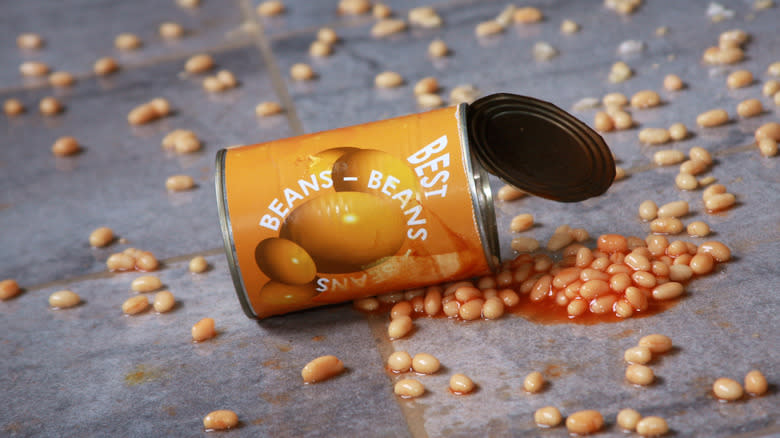
Canned beans are the unsung hero of the kitchen to many. They are often inexpensive and come already cooked, making them an affordable and convenient option for budding home chefs. However, there are a lot of false facts about canned beans out there. You might even believe a few of them yourself. Believing that these common misconceptions are true prevents you from saving money and time while cooking at home if you have been avoiding canned beans.
You might think they are highly processed food or that they have enough BPA in them to harm you. Even if you already use canned beans regularly, there are myths out there that might be holding you back. For example, did you know that canned beans don't actually have an unlimited shelf life, and you might be using expired food in your recipes? You might also think canned beans are only for savory foods — but they are the perfect ingredient for many baked goods, including cakes. Whatever you've heard, we gathered all the false facts about canned beans and researched online to get to the bottom of them for you.
Read more: 13 Canned Foods You Should Avoid At The Grocery Store
False Fact: Canned Beans Are A Highly Processed Food
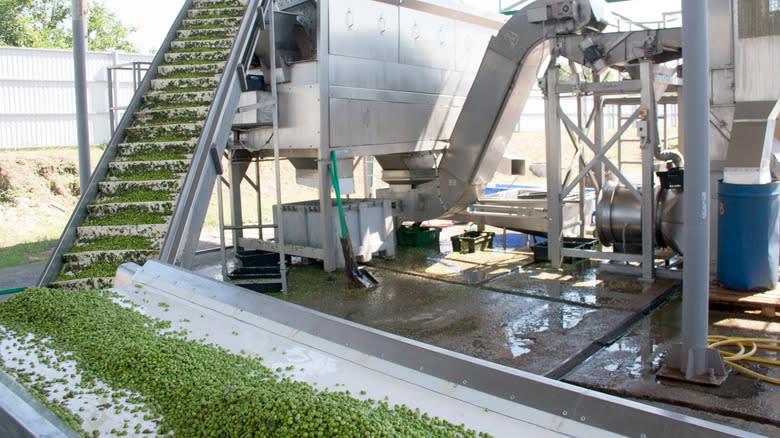
If you are trying to maintain a healthy diet, you might avoid including canned beans because you think they are a highly processed food. This is not necessarily true. While beans in a tin go through the canning process, it is minimal and tends to preserve the natural qualities of the beans. In fact, research shows that while the canning process might impact the color and weight of the beans, their nutritional value remains largely intact. The food does lose some of its phenolic compounds, which act as antioxidants in the body, according to Science Direct, but it retains the same amount of protein.
Canned beans are still a great source of fiber, iron, folate, and, of course, protein. The canning process simply takes what you might do in your kitchen at home and ramps up the scale. The dried beans are rehydrated, cooked, and canned under high amounts of heat and pressure to reduce the possibility of bacteria. Depending on the type of bean, this process doesn't add things you might need to be wary of, like too much sugar or potentially harmful preservatives.
False Fact: Canned Beans Are A Significant Source Of Damaging BPA
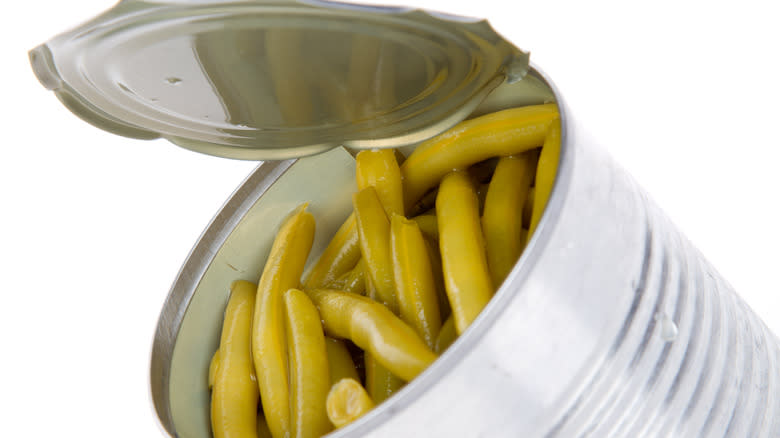
BPA is shorthand for bisphenol A, a chemical that has been used in plastic and some metal coatings since the 1950s. It is harmful to humans when consumed in large quantities, according to the National Institute of Environmental Health Sciences. To avoid ingesting BPA, you might think you have to avoid canned goods altogether. However, this is a false fact because while some canned beans may contain minimal amounts of BPA, many brands now offer completely BPA-free options. The harm caused by this chemical has been in the public consciousness for a long enough time that you can easily find BPA-free canned beans at any local supermarket. Brands like Amy's, Wild Planet, 365 Everyday Value, and even Trader Joe's have entire lines that come in nearly entirely BPA-free cans.
The even better news is that if you are purchasing canned beans that are not marked as specifically BPA-free, you are still not in too much danger. Recent research suggests that the average adult would need to eat more than 60 containers of canned beans every single day to become sick from the BPA present in a typical can. When in doubt, always check the label of your preferred brand for the most up-to-date information.
False Fact: Canned Beans Always Need To Be Rinsed Before Use
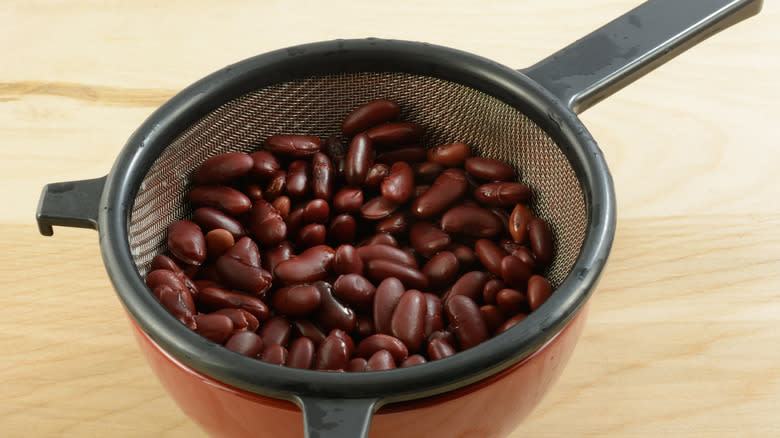
You might have been taught that you always need to rinse canned beans off before you eat them. While this is a great way to reduce your overall sodium intake, it is not a necessary step. Rinsing beans is very different from rinsing produce, for example. When you rinse fresh produce, you are cleaning off possible contaminants like dirt, germs, pesticides, and even the pests themselves, as suggested by the CDC. Canned beans are different in that they are not dirty and do not need to be cleaned.
Instead, whether or not you rinse canned beans before using them simply comes down to the recipe you are using, as well as your personal preference. If you are hoping to bring down your overall sodium intake for your health, rinsing the legume can assist with this. It often reduces the amount present by up to 40%. However, if you are not watching your sodium intake or running short on time, choosing not to rinse your canned beans has no impact on their safety as an ingredient or overall taste, according to The Bean Institute.
False Fact: Canned Beans Have A Never-Ending Shelf Life

If you enjoy using canned beans in your recipes, you might have quite a stockpile of them in your pantry. Unfortunately, a widely believed false fact about canned beans is that they last just about forever. In fact, while the canning process can extend the shelf life of food far beyond that of its fresh counterparts, it does expire eventually. Before cooking with canned beans, always check the use-by date typically on the bottom of the container before consuming them.
Certain conditions can also cause a can of beans to spoil faster. If the can is rusted or has been dropped and dented, air can leak inside and speed up the process. So before buying any, take a look at each can to see if there is any cosmetic damage. If the can is severely dented or the top seems to be swollen, it's best not to buy it or throw it away if it's already at home. This will help keep you from getting sick, according to the USDA. In addition, temperatures above 100 degrees Fahrenheit increase the risk of spoilage; you should store canned goods at or below 85 degrees Fahrenheit.
False Fact: Canned Beans Have A High Sodium Content
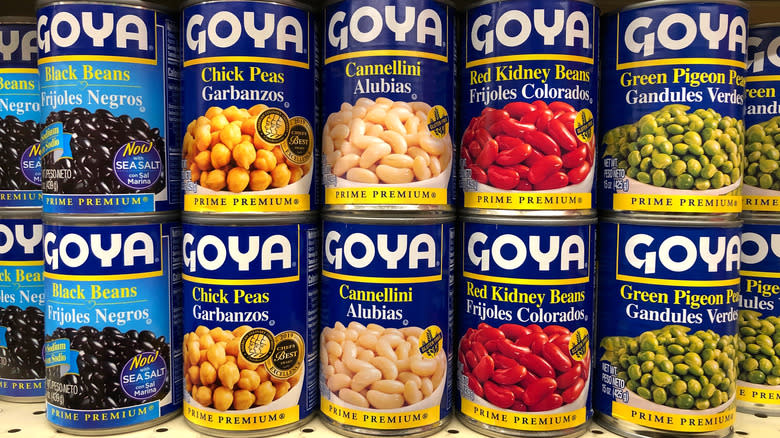
You might have heard that all canned beans have a high sodium content, making them an unhealthy choice for cooking at home. However, most bean brands now offer options with no added salt or manufacture low-sodium versions of popular products. For example, popular canned beans producer Goya offers a range with ⅔ less sodium than the basic options. Competitor Del Monte also offers canned green beans with 50% less sodium than their original option.
If you are watching your sodium, simply check the label on the can when shopping. First, check to ensure the option you choose is the brand's low sodium option, as the packing often looks similar to the regular beans. Low-sodium cans should be clearly marked as such. Next, check the ingredients on the back of the can to compare the amount of sodium in the can against what your doctor has recommended for your daily intake. If you still feel that it is too high, you can drain the beans and rinse them before you use them to cook. This can further reduce the sodium content by up to 40%.
False Fact: Canned Beans Always Have A Metallic Taste
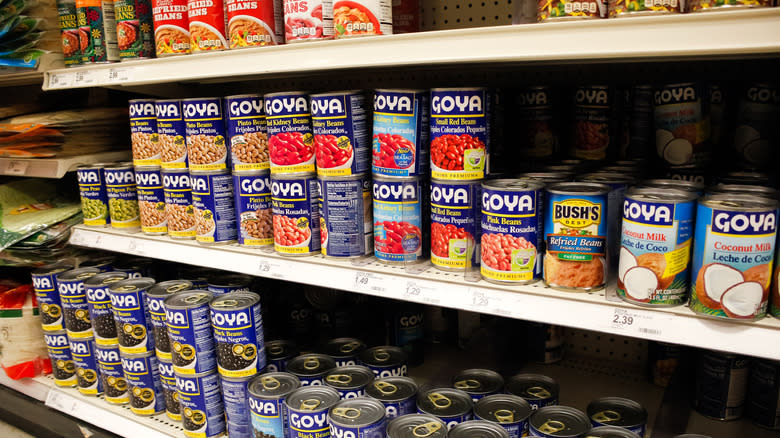
If you don't want to use canned beans in your kitchen because you are concerned they taste too much like metal; you shouldn't. This is because properly processed canned beans should not have a metallic taste. If you purchase commercially prepared beans and they taste like metal, it is likely because the can has started to corrode. This happens when a can has been damaged. It could have been dropped, thus breaking the seal, or became wet and began to rust. Proper storage in a cool, dry place and throwing away warped cans tends to fix the issue. If you ever taste metal, know that you have a batch that is too old or damaged, and simply choose another can.
If you find that the cans are new and undamaged and the taste persists, simply wash the beans. "I always drain tinned beans into a sieve & then rinse, I find it helps get rid of that 'tinny' smell [and] taste," a Reddit user shared. Another way to get rid of the canned taste is simply to add more flavoring to the dish. By mixing in your favorite herbs and spices, you can elevate the flavor profile of the entire meal.
False Fact: Canned Beans Are Only For Emergencies

You might believe the false fact that canned beans are only good when you are in a pinch. For years, most of us might associate the vegetable in this form with emergency preparedness. If a big storm is coming, or you won't have access to refrigeration, you stock up on canned goods. However, beans in this form are a convenient pantry staple for everyday meals. They provide quick and easy access to a versatile ingredient.
For example, if you want to make Mexican pinto beans, using a canned option saves you a lot of time when preparing the meal. The same can be said for whipping up a delicious New Orleans red beans and rice dish or even a fiesta refried bean dip for your next party. If you prefer soup, popping some canned beans into a pasta e fagioli can cut the cooking time nearly in half. When you start looking at canned beans as an everyday option instead of something to only use during a hurricane, a world of new recipes opens up.
False Fact: Canned Beans Are Only Available In A Limited Variety

You might believe the false fact that there are only a few options for canned beans. You are picturing a bland, slimy mess that you can't even tell is a bean once it's taken out of the packaging. Luckily, this is nowhere near the truth. There are plenty of options for canned beans, including black beans, kidney beans, chickpeas, which are sometimes called garbanzo beans, green beans, and more. If you have a favorite bean, there is likely a canned version.
In addition to the different types of beans, there are also different variations of the same bean. For example, if you like green beans, you can buy canned options of standard green beans, French cut, whole beans, in the pod, low sodium, or organic. If you are making a bean salad, for instance, multiple beans might even come pre-blended inside of one can.
False Fact: Canned Beans Are Not As Nutritious As Dried Beans

You might think you have to use dried beans when cooking because canned beans are just not as nutritious. This simply is not true, as canned beans retain much of their nutritional value throughout the preservation process. Plus, in some cases, they can be much more time-saving to use than their dried counterparts when preparing dinner during the busy workweek. "The overall nutritional differences [between canned and dried beans] are often quite minimal, and it's more important to get the benefits of beans by preparing what's convenient for you," Katherine Basbaum, a registered dietitian at MyFitnessPal, told The Huffington Post.
Both canned and dried beans are a great source of nutrition. "The high fiber and nutrient content of beans helps to keep blood sugar in check, lower the risk of cardiovascular disease, and help with weight management due to the filling protein and fiber that beans contain," Basbaum continued. If you would like to reap these health benefits, you don't have to rely on dried beans only — canned will do just fine.
False Fact: Canned Beans Are A Bland Food Option

You might think that canned beans are a boring food option, so you are avoiding using them in your kitchen. When, in fact, canned beans can be seasoned and used in a variety of flavorful recipes, making them an extremely versatile ingredient. The simplest way to make beans taste better on their own is by cooking them with onion and garlic, as well as adding in a few herbs to lift the flavor, like rosemary or thyme.
If you have a little more time on your hands, there are many other ways to prepare canned beans that are full of flavor. For example, you can use a can of northern beans, kidney beans, or chickpeas to whip up a creamy braised white bean dish that is perfect for a holiday gathering. You can also use canned refried beans to create a tasty bean dip for your next party — you can make it spicy by adding a few chopped jalapeños on top. With the right recipe, canned beans are anything but boring.
False Fact: Canned Beans Are Always Mushy
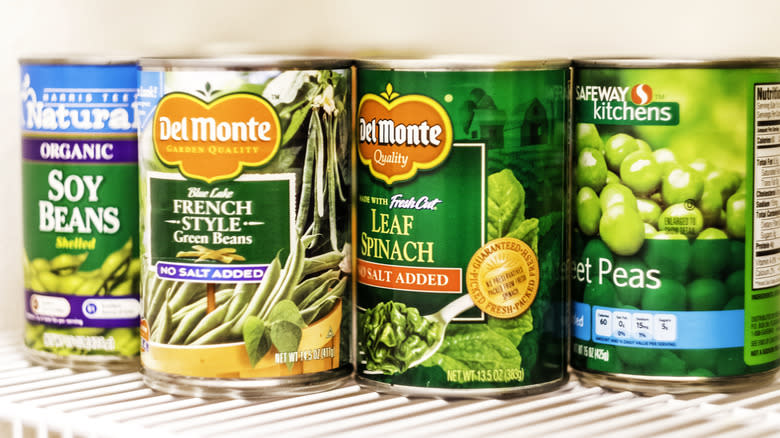
You might be avoiding using canned beans in your kitchen because you think they are slimy, mushy, and overall a bit gross. While it is true that some brands are better than others, the general texture of canned beans varies. While some brands offer beans with a firmer texture, others may be softer. The density also depends on the bean itself. When asked about the taste and consistency of canned beans, Katherine Basbaum from The Huffington Post said, "They all have different textures and flavor profiles so it's nice to have options."
When selecting canned beans that are not mushy and taste great, there are brands to avoid and brands to gravitate towards. For example, Goya and Bush's tend to have great value, while La Costeña and Serious Bean Co. let customers down. In addition, certain bean types just lend themselves to being firmer than others. Kidney beans tend to be firm, even when cooked and canned, while black beans tend to be softer — so try and avoid them if you are worried about things being too mushy.
False Fact: Canned Beans Are Only For Savory Dishes

When you want to make a sweet treat, you might overlook the canned beans in your pantry because you think they can only be used in savory dishes. While it may come as a surprise, beans can actually be used in a variety of recipes, including sweet desserts. When making an after-dinner delight, their mild flavor and creamy texture can enhance dishes like brownies or chocolate cakes.
If you don't have any flour on hand or are trying to bake a gluten-free treat, baking black bean brownies is a great alternative to the traditional option. If you want to try your hand at creating something a bit more adventurous, there is even a cake you can bake that is made entirely of peanuts and beans. By thinking just a little bit outside of the box and inside the can, you can access a whole new world of delectable delights.
False Fact: Canned Beans Are Always Cheaper Than Dried Beans

Canned beans are often thought of as the cheaper option when compared to fresh or dried beans. However, the actual cost of each type may vary. To discover the true cost of the food, you must factor in other considerations, such as time and labor. "Dried beans are cheaper to purchase and have a higher yield than canned beans. That is straightforward. But it takes hours on the stove to prepare dried beans and a minimum of energy expenditure to prepare canned beans," a user shared on Reddit.
Some estimates suggest that a family of four who enjoy beans just once a week might save about $80 per annum by choosing dried beans over canned. However, even if buying dry beans in bulk at the store might be cheaper overall, the amount of time you have to invest in preparing the food often pales in comparison to the quickness of simply opening a can.
False Fact: Canned Beans Are High In Fat

You might think that beans are a food that is high in fat and not so good for you overall. However, this is not true, as canned beans are generally low in fat and can be a healthy source of protein and fiber, too. They also contain plenty of minerals like potassium, iron, and magnesium. Due to these qualities, beans sit very low on the glycemic index and make you feel very full, even when you eat smaller portions of them, according to an article on PubMed.
In fact, studies on PubMed show that including plenty of beans in your diet can lower your blood pressure, reduce your weight, and shrink your waist — all indicators of good cardiovascular health. If you are eating a low-fat diet and struggling to find good sources of protein that keep you feeling full, canned beans are one of the easiest foods to fix this.
Read the original article on Daily Meal.

